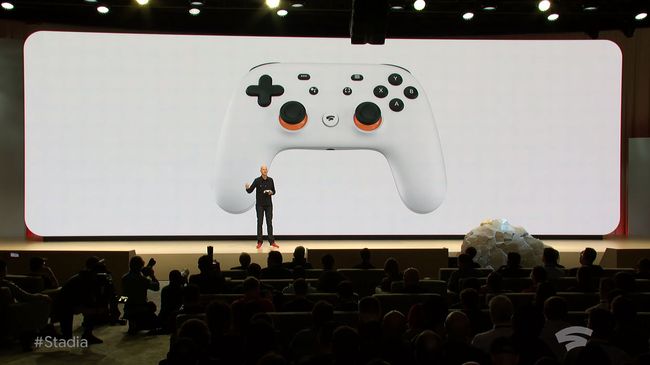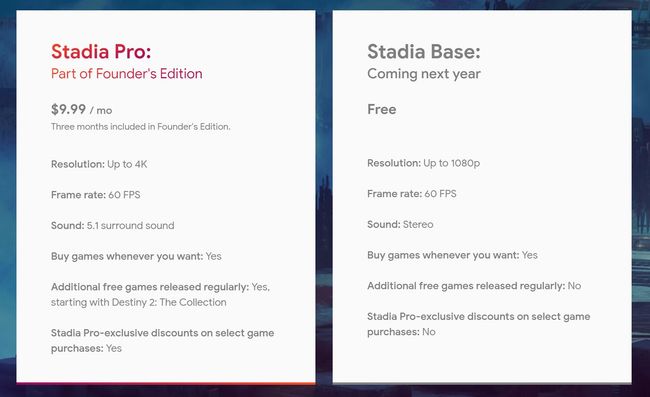How it works, pricing, release date, and what it could mean for the future of PC gaming.
For the years that cloud gaming has existed in some capability, 2019 is that year it went full-steam-ahead, with Google as one of the most important firms leading the way. From what we have seen from game streaming platforms until now, there is an equal amount of potential, hurdles, and questions—as there would be for any other emerging technology.But once Google announced its game streaming platform, Stadia, at GDC 2019, it seemed to stir up more commotion than most. Maybe because Google is a newcomer to the gaming sphere. Maybe because there is a lot of concern about Google's privacy practices. Or maybe because it was the first time people paid attention to cloud gaming on a large scale.
Whatever the case, we're keeping a watchful eye on all things about Google Stadia. Here's what we know so far.
How does Google Stadia work?
Game streaming (or cloud gaming) services render games on a remote server instead of your local machine and then stream the video back to you while it simultaneously sends your input to the server. At the moment, there are two different ways you can play games via the cloud, all with a monthly subscription. You can either access a library of games on a remote server directly from your computer (eg, PlayStation Now), or you can access a remote, virtual PC on which you can install your own games (eg, Shadow). Think of that one like the remote desktop tool, only you are renting a gaming PC somewhere else that you can connect to.Sometimes, you must install the appropriate game launcher if you want to play any games via the cloud. Game streaming services like Jump and PlayStation Now curate their own catalogue of games, so you won't need to install or login to a specific launcher. However, cloud gaming service
Regardless, it seems like Google Stadia will go the 'catalogue of games route' like PlayStation Now, having a variety of games available on their streaming platform for a monthly price. Leading up to its formal announcement at GDC 2019, Google ran Project Stream, a limited test to see how Assassin's Creed Odyssey would run in Chrome browsers via the cloud. Google showed how Assassin's Creed Odyssey and Doom performed on its cloud gaming platform at GDC, but game availability has not
What are Google Stadia's specs?
Google's goal is to provide a seamless streaming experience at 4K 60 fps, and it aims to do so with the following specifications:- Custom x86 processor clocked at 2.7GHz
w / AVX2 SIMD and 9.5MB of L2+L3 cache - Custom AMD GPU
w / HBM2 memory, 56compute units and 10.7TFLOPs - 16GB of RAM (shared between CPU and GPU), up to 484GB/s of bandwidth
- SSD cloud storage
We had some hands-on time with Stadia at GDC, and it seemed like the games were running on a test system designed to simulate different network conditions. Playing Doom felt like it had a latency of 200ms, were running the same game on a Windows PC at 60 fps would be in the 50-70ms latency range.
Digital Foundry did their own testing and analysis of Stadia as well and discovered that Stadia had 166ms of latency compared to the 79ms of latency while playing on a PC at 60fps. For Stadia to work now, you'll need a minimum streaming rate of 15Mbps, latency below 40ms, and data loss below five percent.
What's the release date, pricing, and game availability?
Google will host its first-ever Stadia Connect Thursday, June 6 at 9 AM PDT, where it will reveal more information regarding the release date, pricing, and games. At GDC, Google said it was aiming for a 2019 release date, but we must wait until the Stadia Connect stream to see if that's still the case.Since Google will talk pricing, it seems likely that it will not only go the monthly subscription route but also have subscription tiers for individual plans and family plans. If Google has monthly plans, then I'd expect the cost to be anywhere between $10 and $30 a month, based on other game streaming platforms.
We know that Stadia will have its own game controller—possibly. In a blog post from March 19, Google notes it had not yet got authorization from the Federal Communications Commission to lease or sell the controller. The Stadia controller can connect directly to Google's data center via Wi-Fi, so that's why it needs authorization.
 What do developers think of Google Stadia?
What do developers think of Google Stadia?
Developers, particularly indie developers, had a lot of questions about cloud gaming leading up to GDC, and after they announced Stadia. Revenue models and contracts, privacy, content control, and consumer accessibility were at the front of everyone's minds, but designing games for a cloud streaming future was the biggest one. Google will have its own cloud-based dev tools that will supposedly allow developers to make bigger and better games in the cloud—and specifically to run only on Google Stadia, assuming. But no one knows what designing games in the cloud looks like right now. Well, no one except maybe for Google's own game studio.Developers want to know if Google will pay developers in a traditional revenue model (like Steam and Epic) or if it will pay by the number of hours consumers spend playing a particular game. Other big questions are the target demographic for cloud gaming, considering the 24 million Americans who do not have access to high-speed internet, and who will own all the
The goal of cloud gaming is to remove one key barrier to high-end gaming: the hardware. As our senior writer Jarred Walton pointed out, Stadia has potential, but it will never beat the performance of local hardware—but for those who aren't hardware enthusiasts or who can't afford a high-end rig, cloud gaming
Anything else I should know?
In an interview with Eurogamer, Google revealed its planning to integrate Stadia into its core services; your Gmail account would be your login for Stadia, for example.Google also plans to have something it calls State Share with Stadia, which will allow players to enter a game at a specific moment in time. If you're watching a game stream of someone playing via Stadia, you might hop in and play from that same point.
Stadia could shake up the gaming industry, or it could flop. Even with a few announcements on the horizon about pricing and when it will be available, it's still too hard to predict just how—or when—cloud gaming and game streaming services will catch on, and to what extent. Still, we're curious how Stadia and all its extra features will work in practice.
More details from today's event.
Today, Google unveiled pricing details for Stadia, the company's forthcoming game streaming service. Stadia Pro, the service's premium subscription model, will cost $9.99 per month. That subscription will get you "regular content" added to your library, and will support Stadia's highest quality level: 4K, HDR, 60fps.
While the
Google also announced a limited edition launch pack called the Stadia Founder's Edition for $129. It comes with a limited-edition gamepad, a Chromecast Ultra, Destiny 2: The Collection, and a three-month subscription to Stadia Pro (plus a three-month buddy pass). Purchasing the Founder's Edition will also give you first dibs on claiming your Stadia username.
As for the games, Stadia will launch with games from publishers like Ubisoft, Square Enix, and Activision. Assassin's Creed Odyssey, which Google used to test its streaming prototype, will be available, along with The Division 2, Doom and all three of the Tomb Raiders. For a full list of games, head over here.
The minimum requirements are 10 Mbps download and 1 Mb upload, while 35 Mbps
Google has yet to reveal an official release date, but Canadian news site
Initially, you'll need a Stadia











